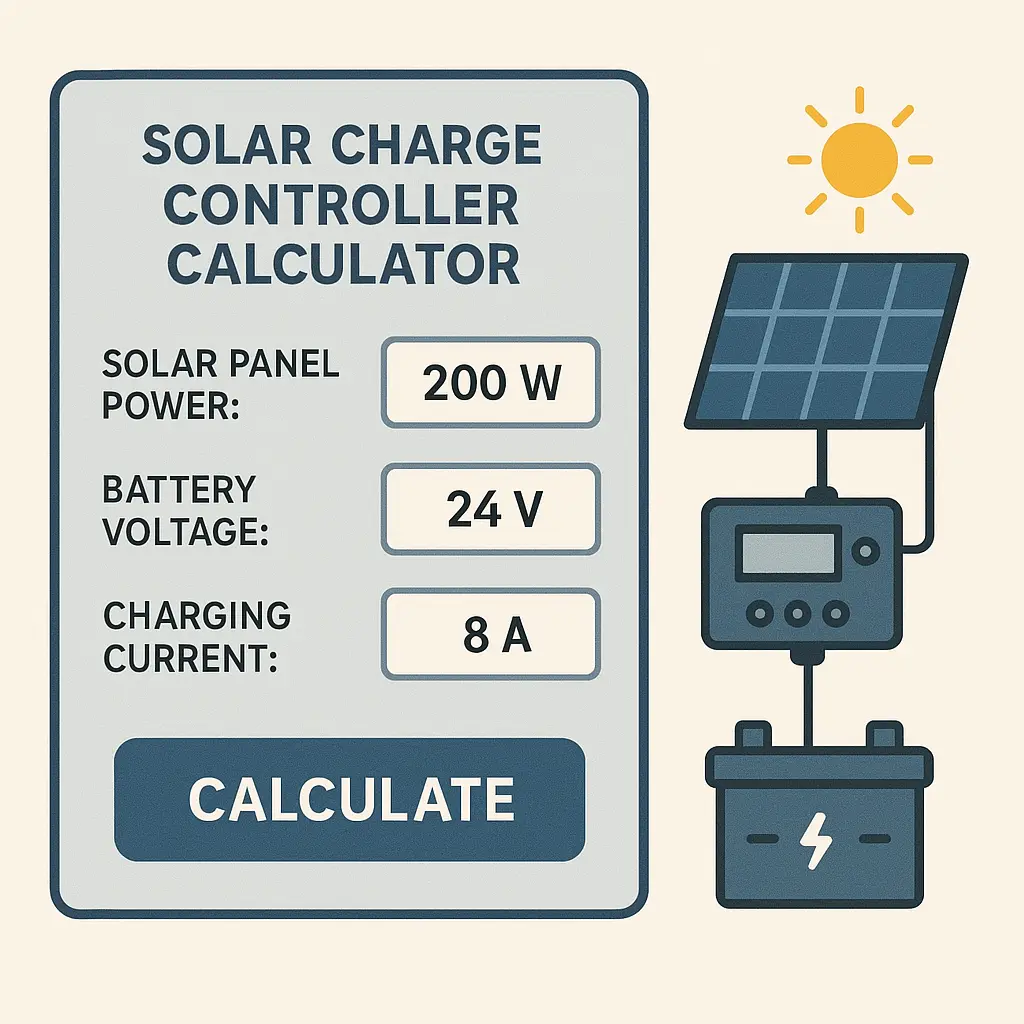Prevent overcharging, maximize power harvest
Accurately size your solar charge controller for optimal battery charging and system efficiency
System Parameters
Controller Sizing Results
Minimum Controller Current
Recommended Controller
MPPT Efficiency
Power Harvest Gain
MPPT vs PWM Comparison
| Feature | MPPT Controller | PWM Controller |
|---|---|---|
| Efficiency | 94-99% (Superior) | 70-80% (Moderate) |
| Panel Voltage Compatibility | Higher than battery voltage | Must match battery voltage |
| System Size | Ideal for 150W+ systems | Best for small systems |
| Cost | Higher initial cost | Lower initial cost |
| Power Harvest | Up to 30% more power | Standard power harvest |

Understanding Solar Charge Controllers
A solar charge controller regulates voltage and current from solar panels to batteries, preventing overcharging and maximizing efficiency. Our calculator helps you determine the perfect controller size for your specific solar setup, whether you’re using PWM or MPPT technology. Learn more about charge controller basics from the U.S. Department of Energy’s Solar Technologies Office.
Why Proper Sizing Matters
An undersized controller can overheat and fail, while an oversized one wastes money. The right size ensures optimal battery charging, system safety, and maximum power harvest from your solar panels in all weather conditions. For best practices on sizing and system performance, check out this NREL guide on PV system design and sizing.
MPPT vs PWM Controllers
MPPT controllers are 20-30% more efficient but cost more. PWM controllers are budget-friendly but require panel voltage to match battery voltage. Our comparison table and calculator help you choose the best option for your needs and budget. For a technical breakdown, visit Victron Energy’s article on MPPT charge controllers.
Sizing Formula
To calculate the minimum charge controller current:
Then add safety margin:
For MPPT controllers, also consider:
MPPT Advantages
MPPT (Maximum Power Point Tracking) controllers offer significant benefits:
- Increase energy harvest by 15-30% compared to PWM
- Allow higher voltage solar arrays (reducing wiring costs)
- Better performance in cloudy conditions
- Superior battery charging algorithms
- Ideal for colder climates where panel voltage increases
For systems over 200W, MPPT controllers typically provide the best ROI.
System Size Examples
Common solar system sizes and recommended controllers:
300W System
12V: 30A
24V: 15A
600W System
12V: 60A
24V: 30A
1000W System
24V: 50A
48V: 25A
1200W System
24V: 60A
48V: 30A
If you have a different solar system size and want a recommendation, use our solar panel calculator to get instant results.
Solar Charge Controller FAQs
- Determine your system voltage (12V, 24V, or 48V)
- Calculate total solar panel wattage
- Divide total wattage by system voltage to get minimum current
- Add 20-25% safety margin to account for ideal conditions
- Select a controller with equal or higher current rating
- For MPPT, ensure maximum input voltage exceeds panel Voc
Example: 600W system at 24V needs 600 ÷ 24 = 25A minimum, plus 25% safety margin = 31.25A → use 35A controller.
- 12V system: 1200W ÷ 12V = 100A → 125A controller (with 25% margin)
- 24V system: 1200W ÷ 24V = 50A → 60A controller
- 48V system: 1200W ÷ 48V = 25A → 30A controller
For systems above 1000W, we strongly recommend a 24V or 48V system to reduce current requirements and wiring costs. An MPPT controller is essential for this size system.
- 12V system: 1000W ÷ 12V = 83.3A → 100A controller
- 24V system: 1000W ÷ 24V = 41.7A → 50A controller
- 48V system: 1000W ÷ 48V = 20.8A → 25A controller
At 1000W, a 24V or 48V system with an MPPT controller is highly recommended. Avoid 12V systems at this wattage due to the high current requirements.
- 12V system: 300W ÷ 12V = 25A → 30A controller
- 24V system: 300W ÷ 24V = 12.5A → 15A controller
For small systems like this, both PWM and MPPT controllers can work. If using a single 300W panel (typically 36-40V), an MPPT controller is required for 12V systems to step down the voltage.
Then add a safety margin of 20-25%:
Additional considerations:
- For PWM controllers: Panel Vmp must match battery voltage
- For MPPT controllers: Ensure Voc at coldest temperature is below controller max input
- Check controller specifications for maximum PV input power
- Required controller current based on panel wattage and battery voltage
- Maximum string size based on temperature coefficients
- Voltage drop calculations for wiring
- Compatibility with specific battery types
You can download a free MPPT calculator Excel sheet from reputable solar websites like Victron Energy, Renogy, or AltE Store. Our online calculator provides similar functionality without needing Excel.
- Calculate minimum current: Total Wattage ÷ 48V
- Add 25% safety margin
- Determine maximum string voltage: Check panel Voc and temperature coefficient
- Ensure controller max input voltage > (Panel Voc × Number in series) × 1.2 (for cold temperatures)
- Verify total PV input power rating exceeds your array size
Example for 2000W system:
- Current: 2000W ÷ 48V = 41.7A → 50A controller
- For 40V panels: Max 3 in series (120V) for 150V controller
- 12V system: 1200W ÷ 12V = 100A → 125A controller (with 25% margin)
- 24V system: 1200W ÷ 24V = 50A → 60A controller
- 48V system: 1200W ÷ 48V = 25A → 30A controller
Important considerations for 1200W systems:
- Use MPPT controller for best efficiency
- 48V system is highly recommended to reduce current
- Divide panels into multiple strings for better shading tolerance
- Consider dual controllers for large systems
